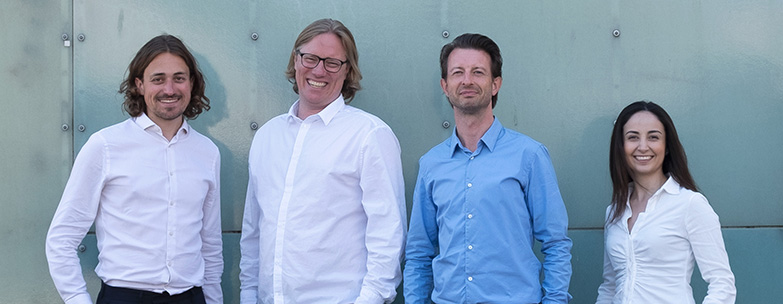Trailblazers hired for university innovation centre
New companies launched by researchers, students and graduates is a significant way to distribute university knowledge. Direct experience with innovation and entrepreneurship is increasingly seen as a crucial 21st century skills for any first-rate university to provide. Copenhagen Science City-partner University of Copenhagen has a strong support structure for staff and students with start-up dreams. Now, the organisation has been strengthened with four new hires, for the university’s up-coming cross-faculty innovation centre, “Lighthouse”. By Jes Andersen.
Connecting the dots
More than 200 new companies are launched by University of Copenhagen affiliates every year. Until recently, support for student-entrepreneurs was a distributed effort handled by 10 staffers at the university’s six faculties. Marius Sylvestersen is the University’s Chief Innovation Officer and leader of the coming “Lighthouse” innovation centre. He expects his four new staffers to connect the faculty efforts in new and meaningful ways.
The university is a world leader in deep academic knowledge. There is enormous potential in that, but empirically we see a lot of innovation taking place in the gaps between disciplines. I want my new hires to be agents of change for increased cross-faculty co-creation”: Marius Sylvestersen, Chief Innovation Officer, University of Copenhagen.
Strong support from Law
In the public eye, the legal profession is not usually associated with innovation and entrepreneurship. None the less Jacob Graff Nielsen, who is the Dean at University of Copenhagen, Faculty of Law, shares Sylvestersen’s hopes.
In society we see a need for graduates and researchers who can initiate or help and support start-ups. We already have courses with this aim at the Faculty of Law, and we see a great potential for synergy between students, start-up communities and researchers. Interaction between the university and the start-up community results in a hands-on opportunity and puts theory into practice to the great benefit of both students and start-ups. Strengthening the Innovation Center at the University of Copenhagen with the recruitment of experienced and highly competent staff is an important step towards fulfilling this potential”: Jacob Graff Nielsen, Dean, Faculty of Law, University of Copenhagen.
Attract, engage, create, strengthen
The four new hires will be the first occupants in a brand-new innovation centre that is, in itself, a collaborative effort. University of Copenhagen is co-creating Lighthouse with The Royal Library. Here, they will launch efforts to engage students, attract companies, create events, raise funds and strengthen ties to other innovation ecosystem actors. The four new hires are:
- Kasper Ørtenblad. Start-up founder. Experience in patent-processes. Expertise in investment raising
- Thomas Ebdrup. Expertise in cluster-organisations, Public Private Partnerships and fundraising.
- Luisemay Seberton. Communication experience from foreign office and employers’ association.
- Anne Egfjord. Experienced corporate project manager with trade union expertise in student recruiting.
Bricks and mortar for the innovation effort
The first and most pressing task for the new hires will be to prepare the Lighthouse building for students who want to build a business and for tutors wanting to teach innovation and entrepreneurship. Next step is to raise awareness of the university’s innovation potential. Internally as well as externally, says Sylvestersen.
Foundations, companies, cluster organisations and industry organisations all want to solve societal challenges. We want to help bridge the existing gaps between these organisations and the university. We also want to help the University be more daring in reaching out and contributing its insights”: Marius Sylvestersen, Chief Innovation Officer, University of Copenhagen.
Long term goal to provide start-up tools to academics
As Lighthouse gradually intensifies its student entrepreneurship support, Sylvestersens’ next goal is to help the university with another task. They hope to encourage young researchers to explore innovation and entrepreneurship and he hopes to help. Using I&E-tools could be a means for Ph.D.’s and postdocs to share their knowledge and a way to shape their own careers and create jobs for others.




